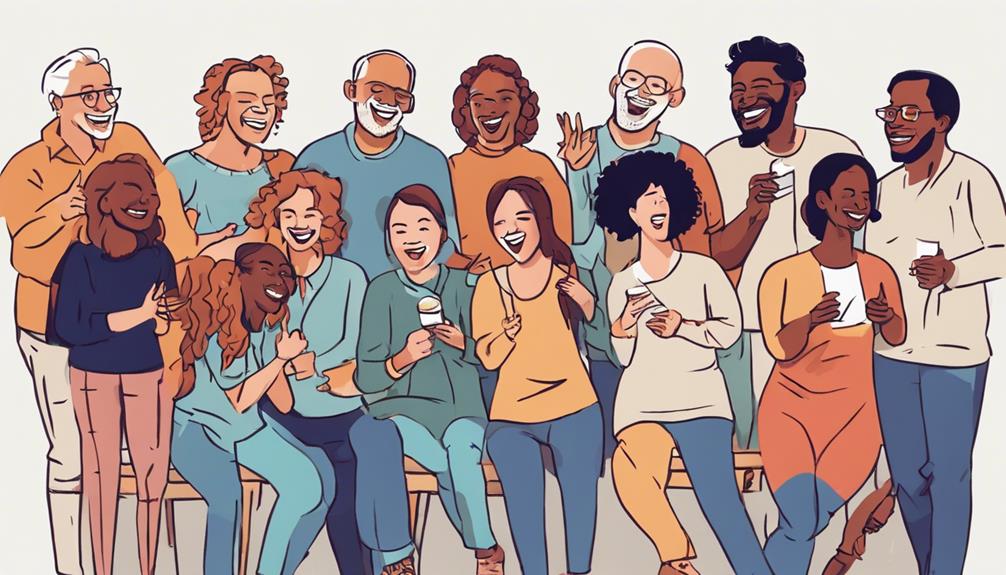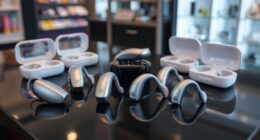To succeed as a deaf professional, advocate for your needs by openly communicating accommodations like captioning and sign language interpreters. Build a strong support network with mentors, allies, and industry groups, and leverage accessible tech like VRS and captioned platforms to stay connected. Focus on developing your skills through online courses and certifications, and address workplace challenges confidently. For more strategies to thrive and grow, discover how continuous improvement and advocacy can open new opportunities.
Key Takeaways
- Advocate proactively for necessary accommodations and communicate specific needs during interviews and in the workplace.
- Leverage assistive technologies like captioning, VRS, and sign language apps to enhance communication and productivity.
- Seek mentorship from experienced deaf professionals and participate in industry events to build support networks.
- Continuously develop skills through online courses, certifications, and professional development tailored for deaf individuals.
- Know your rights under ADA, address discrimination, and foster inclusive environments to ensure fair treatment and career growth.
Embracing Self-Advocacy and Communicating Your Needs

Embracing self-advocacy is essential for ensuring your workplace needs are understood and met. You need to communicate your needs clearly, whether requesting ASL interpreters, captioning, or other accommodations. Using protective styling benefits can also help maintain your hair health while advocating for your appearance preferences. Being proactive during interviews and onboarding helps set expectations and confirms your accessibility requirements from the start. Sharing specific details about assistive technology or support services you use fosters understanding and creates a more inclusive environment. Regularly reminding supervisors and colleagues about your accommodations keeps your needs visible and prevents misunderstandings. Understanding industry trends can also empower you to connect with colleagues who share similar interests, fostering a sense of community. Additionally, utilizing AI in Business tools like chatbots or sentiment analysis can assist in effectively communicating your needs and gathering feedback. Confidence is key—knowing your legal protections, like the ADA, empowers you to advocate effectively.
Building a Support Network and Finding Mentors

Building a strong support network is essential for steering your career as a deaf professional. Connecting with experienced mentors through organizations like the National Association of the Deaf or local events can provide valuable career guidance.
Developing relationships with mentors who understand your unique challenges offers tailored support and mentorship. Networking at industry conferences or workshops focused on deaf employment helps expand your support system and introduces you to potential mentors.
Building relationships with mentors who understand your challenges fosters tailored support and growth.
Online forums and social media groups dedicated to deaf professionals enable peer-to-peer advice, resource sharing, and community building. Additionally, workplace champions or allies trained in deaf awareness can serve as informal mentors and advocates within your work environment.
A well-rounded support system and meaningful mentorship are key to advancing your career confidently.
Leveraging Accessible Resources and Technology

Using assistive technologies and accessible communication platforms can considerably improve your workflow and interactions. Tools like captioned phones, VRS, and sign language apps make daily tasks easier and more efficient. Developing a good understanding of vetted products ensures you select safe and effective tools tailored to your needs. Staying current with new innovations empowers you to work more independently and confidently. Additionally, familiarizing yourself with the benefits of eye patches can enhance your self-care routine and overall well-being. Exploring survivalism techniques, such as emergency preparedness and resource management, can further boost your resilience in various situations. Being aware of self watering plant pots and their design features can inspire adaptive solutions for maintaining plant health in different environments. Knowing about accessible tools helps you optimize your productivity and communication effectiveness.
Assistive Technology Tools
Assistive technology tools play an essential role in helping deaf professionals communicate effectively in the workplace. These tools, such as real-time captioning and video relay service (VRS), provide crucial accessibility and communication support.
Real-time captioning converts spoken words into text instantly, allowing you to follow conversations seamlessly. Advances in AI have significantly improved the accuracy and responsiveness of captioning services, making communication even more effective. AI-powered captioning solutions now adapt to different accents and speech patterns, further enhancing communication clarity. VRS enables you to connect with colleagues via sign language interpretation over video calls. Many socialization opportunities in the workplace now incorporate these technologies to foster inclusive environments.
Devices like CaptionCall and Sorenson VRS are federally funded in the U.S., offering free or low-cost options. Many workplaces also use specialized software, webcams, and instant messaging platforms to enhance communication.
Legal regulations like the ADA require employers to provide these assistive technologies, ensuring you can perform your role without communication barriers. Advances continue to improve remote work, integrating captioning and interpretation into virtual meetings. The market growth projected at over 40% CAGR in AI tech by 2025 is also fostering innovations in assistive communication technologies.
Accessible Communication Platforms
Accessible communication platforms like VRS, captioned phone calls, and integrated virtual tools enable deaf professionals to engage effectively in the workplace. These support tools guarantee clear, real-time communication, reducing misunderstandings and fostering productivity. Accessible communication tools are increasingly recognized as essential for equitable workplaces. Technologies such as instant captioning and sign language interpretation apps provide seamless information exchange during meetings, whether in person or virtual. Many companies now incorporate accessible communication as standard practice, aligning with legal requirements under the ADA and similar regulations. Cloud-based platforms like Microsoft Teams and Zoom offer built-in captions and ASL interpreter integrations, promoting inclusive virtual collaboration. Additionally, ongoing advancements in assistive technology continue to enhance the accuracy and effectiveness of communication tools, making workplaces more inclusive. Implementing communication accessibility standards ensures consistent support for all employees. Innovations in AI security also help protect sensitive communication data, ensuring confidentiality and trust in digital collaboration.
Digital Resource Utilization
Have you ever considered how digital resources can boost your career as a deaf professional? Using accessible resources and digital tools opens new doors for growth.
You can explore online job boards like DeafJobWizard.com, which offer tailored tips and accessible application processes. Assistive apps can improve your workflow and communication, increasing employment retention by up to 25%. Sign language videos and captioned webinars support ongoing learning and skill development. Incorporating visual technology into your daily routine can further enhance your professional effectiveness and confidence. Additionally, Ford Tuning techniques demonstrate the importance of customized approaches to optimize performance, whether for vehicles or personal career growth.
Video relay services (VRS) and captioned platforms enhance remote collaboration and networking. With adjustable font sizes, contrast settings, and ASL content, many digital resources cater to your visual needs. Advances in AI technology are also transforming how assistive tools function, providing more personalized support. Understanding indoor air quality and proper maintenance of devices like air purifiers can contribute to a healthier work environment, especially if you work in shared or office spaces. Incorporating accessible technology into your daily routine can further enhance your professional effectiveness and confidence.
Embracing these tools can make your professional journey more efficient, connected, and empowering.
Overcoming Workplace Challenges and Discrimination

You can effectively address workplace discrimination by knowing your rights under the ADA and keeping detailed records of incidents. Utilizing resources such as FAQs can help you better understand available support and tools. Building a culture of inclusion requires proactive communication and early disclosure of your needs. When you speak up and seek support, you help create a more equitable environment for everyone.
Addressing Discrimination Effectively
When facing discrimination in the workplace, taking proactive steps can make a significant difference. Document every incident thoroughly—note dates, times, witnesses, and details—to strengthen your case.
Know your legal rights under laws like the ADA and the Equality Act, which require reasonable accommodations and protect against discrimination.
Openly communicate with HR or a trusted supervisor about your needs and challenges; clear dialogue can lead to understanding and resolution.
Seek support from advocacy organizations such as the National Association of the Deaf or Citizens Advice to guide your actions.
If discrimination continues, consider mediation or filing formal complaints, following proper procedures to ensure your concerns are addressed effectively.
- Stand firm in your legal rights and advocate for fair treatment.
- Keep detailed records to support your claims.
- Reach out to advocacy groups for guidance and support.
- Persist in addressing issues until resolved.
Building Workplace Inclusion
Building workplace inclusion is essential for creating a supportive environment where deaf professionals can thrive. When inclusion is prioritized, discrimination decreases, and everyone feels valued.
Providing accommodations like ASL interpreters and captioning during meetings improves communication and helps break down barriers.
Implementing diversity and inclusion training fosters understanding and reduces indirect discrimination, making the workplace more welcoming.
You’ll find that strong inclusion policies lead to higher retention rates, with deaf employees feeling more supported and engaged.
Visible organizational support is vital; it encourages you to report discrimination or request accommodations without fear.
Emphasizing diversity and inclusive practices creates a culture where all employees, regardless of hearing ability, can contribute fully and confidently.
Building this environment benefits everyone, strengthening your organization’s overall success.
Developing Skills and Continuing Professional Growth

Continuous learning is essential for deaf professionals to stay current with evolving industry skills and trends. By embracing professional development, you can actively pursue skill growth and keep pace with advancements. Engaging in online courses, industry webinars, and tailored workshops enhances communication and leadership abilities.
Continuous learning helps deaf professionals stay current and grow through courses, webinars, and workshops.
Seeking mentorship from experienced deaf professionals offers guidance and invaluable insights for your career journey. Earning relevant certifications, like in sign language interpretation or accessible tech, boosts your employability and opens new opportunities.
Regular self-assessment helps you identify skill gaps and set targeted goals for ongoing growth. Remember, your commitment to continuous learning fuels your success and empowers you to thrive in your career.
- Feel confident in your evolving expertise and skills
- Inspire others with your dedication to growth
- Access new opportunities through certifications
- Build a supportive network through mentorship
Navigating Career Transitions and Exploring New Opportunities

Managing career changes can be challenging, but many deaf professionals have successfully shifted into new fields by leveraging online courses and certifications to develop in-demand skills. To navigate career transitions, focus on targeted professional development and strategic planning. Networking is crucial; connect with deaf community organizations and attend industry-specific events to discover new job opportunities and gain insights. Accessible career counseling and mentorship programs tailored for deaf individuals can smooth your transition into unfamiliar industries. Embracing remote work offers flexibility and reduces communication barriers, making it easier to explore different roles. Here’s a quick look at key strategies:
| Strategy | Benefit | Example |
|---|---|---|
| Online Courses | Skills for new fields | Tech, marketing, healthcare |
| Networking | Industry insights and connections | Deaf community events |
| Mentorship | Guidance during transition | Deaf-focused programs |
| Remote Work | Flexibility and accessibility | Telecommuting roles |
| Continuous Growth | Increased success in new opportunities | Professional development |
Frequently Asked Questions
Is It Difficult for Deaf People to Get Jobs?
You may find it challenging to get a job because of higher unemployment rates and misconceptions about your communication skills.
Many employers lack awareness of accommodations and might have biases, making the hiring process tougher.
Limited access to tailored resources can also hinder your job search.
However, by advocating for yourself, seeking supportive employers, and utilizing available resources, you can improve your chances of finding a fulfilling career.
What Is the Most Common Job for a Deaf Person?
You might wonder what the most common job for a deaf person is. Many find work in customer service roles, especially those involving written communication like chat support.
Others excel in administrative positions that rely on visual skills, or in tech fields such as software development or cybersecurity.
Creative industries like graphic design and digital marketing also attract many deaf professionals because of their visual nature and flexibility.
What Is the Best Paying Job for Deaf People?
Did you know that executive roles in diversity-focused organizations can pay over $150,000 annually?
For deaf professionals, the highest-paying jobs often include executive positions, legal and consulting roles in accessibility, and STEM careers like cybersecurity or data analysis.
These roles leverage your skills and dedication, offering both financial rewards and meaningful impact.
Which Career Focuses Care to Individuals Who Have Hearing Impairments?
If you’re looking for a career that focuses on caring for individuals with hearing impairments, consider roles like counseling, social work, or advocacy. These jobs let you support others through your personal experience and understanding.
You could also work as a deaf education specialist or sign language interpreter, helping bridge communication gaps. All these careers allow you to make a real difference, providing support and improving quality of life for those with hearing challenges.
Conclusion
Think of your career journey as a mighty river, flowing with challenges and opportunities. With self-advocacy as your compass and a strong support network as your steady boat, you navigate obstacles with confidence. Accessible tools and unwavering resilience are your oars, guiding you toward new horizons. Embrace each twist and turn, knowing you’re the captain of your voyage. Your determination turns the current into a path leading to endless possibilities.










